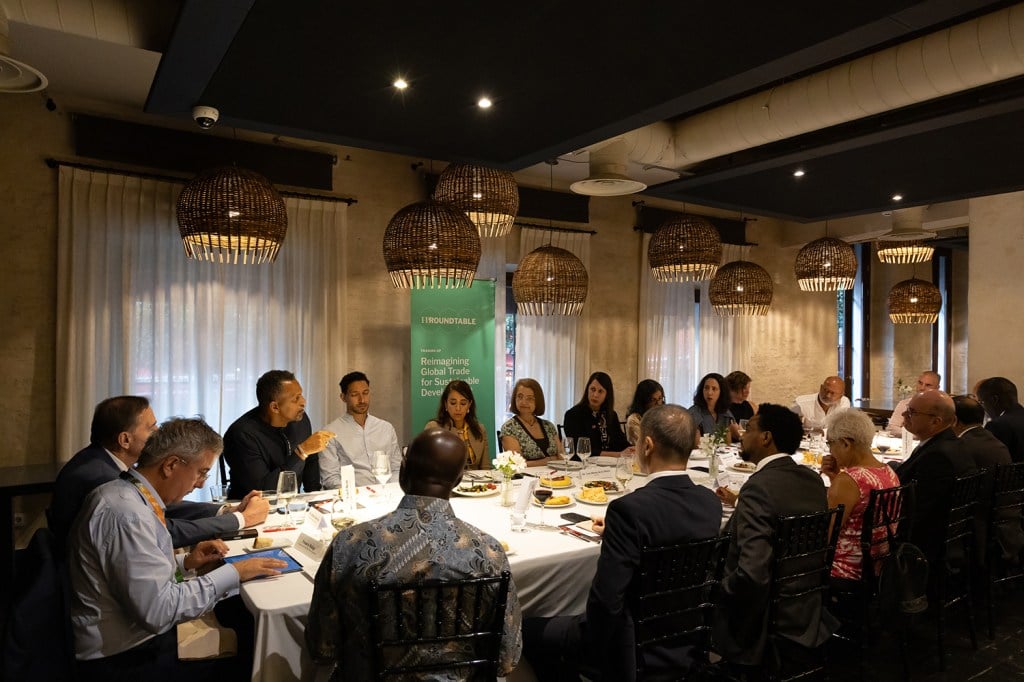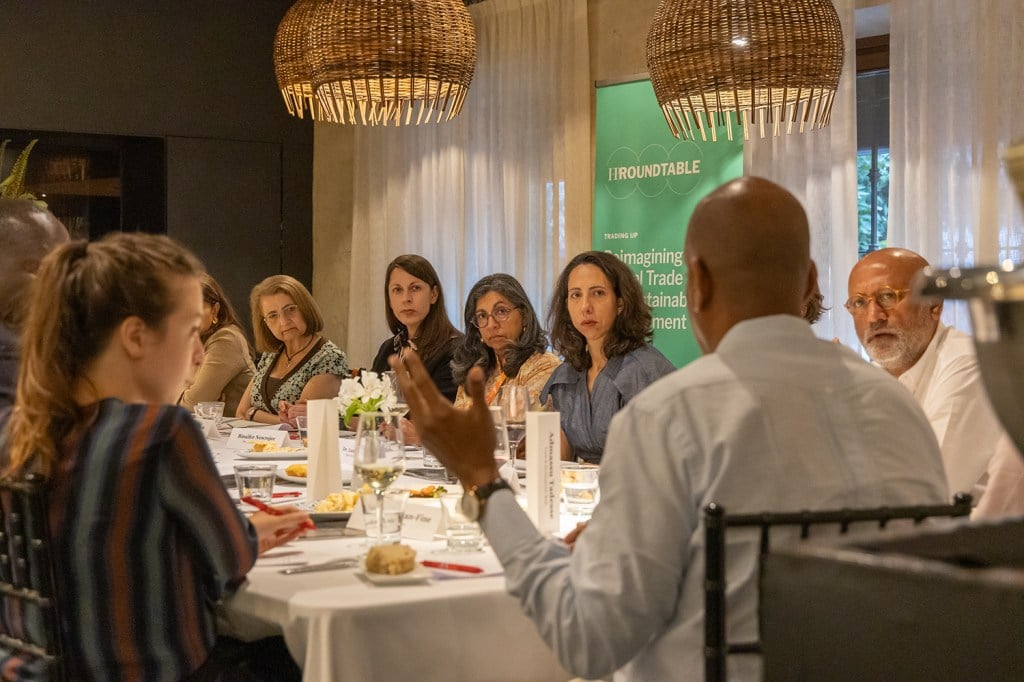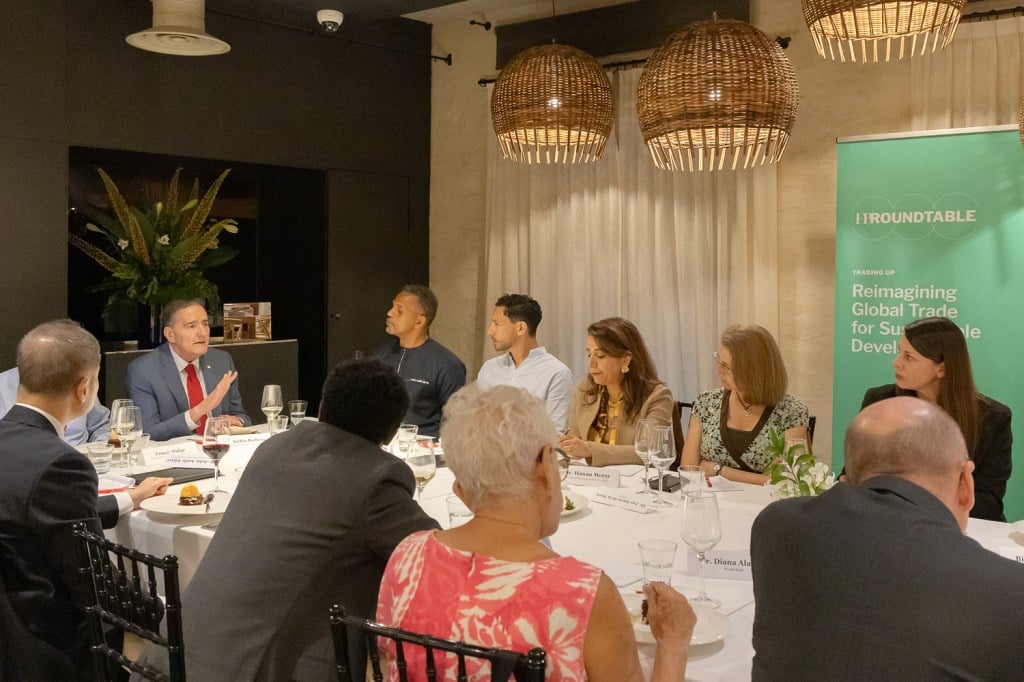Trading Up
Reimagining global trade for sustainable development
A synthesis report by FP Analytics with support from the Open Society Foundations
Against a backdrop of global fragmentation and geopolitical tensions, the 4th International Conference on Financing for Development (FfD4) attracted a range of stakeholders to address the structural and systemic flaws that have long undermined development and exacerbated inequities. The outcome document of (FfD4), Compromiso de Sevilla, which was developed to guide action at and following FfD4, recognized trade as an engine for inclusive growth and poverty eradication. In particular, it identified the erosion of the multilateral trading system as an important issue for financing in the same vein as the 2015 Addis Ababa Action Agenda. Recognizing that the current trade architecture is not fit for purpose, the international convening in Sevilla presented an opportunity to discuss concrete reforms and craft more equitable global trading systems that enable low-carbon development, economic diversification, and resilience for developing countries.
On the sidelines of this global convening, Foreign Policy and Open Society Foundations held a policy-focused roundtable conversation, Trading Up: Reimagining Global Trade for Sustainable Development, that ventured beyond the impact of recent trade and tariff measures to diagnose the core deficiencies of the current trade system and to co-develop forward-looking solutions. This closed-door, Chatham House Rule discussion brought together leaders from government, finance, academia, and civil society to explore how trade policy can become a lever—not a barrier—for sustainable development. This synthesis report provides an overview of the discussion topics and distills the key takeaways from the wide-ranging discussion.

Discussion Topics
- Diagnosing specific challenges with the current trade system that limit, if not undermine, the development agenda of countries in the global south
- Identifying concrete proposals and potential solutions for addressing structural flaws in global and regional trading systems and related market mechanisms
- Exploring the trade policies and frameworks that can meaningfully support green industrial policy in countries in the global south, enabling those countries to leverage the climate transition for sustainable growth
- Identifying concrete strategies and mechanisms for equitable inclusion of least-developed countries, landlocked countries, and small island developing states in global value chains, such as issues related to critical minerals beneficiation and measures to boost trade in natural resources- and commodity-dependent developing countries
- Identifying means to collaboratively advance the trade-related outcomes of FfD4

Key Takeaways
Fundamental reforms are needed to ensure a just multilateral trade architecture that works for all. Low-income and developing countries are mostly at a disadvantage in the current global trade regime and have often been excluded from policy and investment decision-making processes. In some instances, rules, under the guise of upholding sustainability standards, become trade barriers and can increase the production and operational costs for low-income and developing countries. These and other compounding challenges make it harder for producers to compete on price and quantity, hindering competitiveness and their full participation in global trade. To address inequities in global trade, systemic reforms need to prioritize inclusive rule-making that guarantee under-represented countries a seat at the table, provide technical and legal support, and uphold fair trade agreements. These reforms need to include mechanisms that protect low-income and developing countries against unfair trade practices and ensure that they receive sustained benefits from trade and investment deals, while retaining enough flexibility to implement national policies that are aligned with their respective development goals.
Low-income countries and developing economies need to strengthen domestic industries and internal markets to boost trade competitiveness. Participation in trade alone is not enough to drive development and eradicate poverty. Strengthening domestic production capacity and productivity, particularly in value-added sectors, remains crucial for trade to foster sustainable development. Policies and financing mechanisms need to be crafted to prioritize and more effectively drive local value creation, increase incomes, and carry knock-on economic impacts. Countries rich in critical minerals, for example, have an opportunity to develop local value chains and pursue export strategies that are tied to broader societal goals, such as expanding local and regional industrial bases, environmental sustainability, labor protections, and gender equality. Multilateral institutions have a role to play and are well positioned to craft and leverage novel financing instruments that decrease debt burdens and foster local development, such as debt-for-resilience swaps and scaling up Aid for Trade initiatives.

Trade policies aimed at addressing climate change should not have disproportionate impacts on low-income and developing countries. Ensuring that trade policies are climate-sensitive will be important for long-term sustainability and resilience, but it is important that low-income economies, which have contributed the least to climate change, are not disadvantaged or hampered. For example, carbon border adjustment mechanisms (CBAMs), or carbon tariffs, need to be multilaterally agreed upon and rather than unilaterally imposed by advanced economies, as such actions risk creating trade distortions and adversely affecting low-income country exporters. To support a just energy transition and advance global climate goals, developing countries need to be able to access low-carbon technologies and know-how more readily and cost-effectively. Facilitating green technology transfer and intellectual property–sharing agreements could help reduce carbon emissions and accelerate progress toward sustainable development targets. Moreover, considering that many of the least-developed countries, and particularly small island developing states, are among the most vulnerable to climate change, clauses that facilitate trade and allow for temporary tariff or non-tariff barrier reductions could be implemented as states recover from climate-induced disasters.
Align public-private partnerships in trade with specific public goals and development outcomes. Public or multilateral support for private entities, whether through subsidies, guarantees, loans, or other mechanisms, should be conditioned on meeting broader development objectives. One notable example of a public-private partnership referenced by participants that served public interest is the deployment of the AstraZeneca vaccine at the height of the COVID-19 pandemic, where publicly funded Oxford University researchers made global accessibility of the vaccine a condition of their partnership with the company, enhancing equitable vaccine access globally. Purposeful public-private and government-to-government partnerships hinge on the ability of developing countries to negotiate and steer agreements in line with their development priorities. Without such capacity, countries risk entering complex and unfavorable concessions that extract resources without delivering clear public benefits and compromising sustainability.
Strengthening regional trade integration and cooperation have the potential to generate economic benefits and enhance resilience, especially in light of global trade fragmentation. Regional trade integration has the potential to lower production costs, foster local industry development through technology transfer, and support integration into regional value chains. It could also enable more cost-effective, large-scale procurement of goods, as was the case with COVID-19 vaccine procurement where regional coordination helped reduce costs and secure more affordable vaccines. The African Continental Free Trade Area (AfCFTA) has driven a major push toward intra-regional trade in Africa in recent years, aiming to achieve higher-value production and create higher-wage jobs. However, the success of AfCFTA and other regional trade cooperation initiatives depends on investments in regional infrastructure that reduce transportation costs and enable broader economic activity, harmonization of trade standards, access to lower-cost capital, and facilitation of more seamless cross-border payment systems.
Looking Ahead
The Compromiso de Sevilla, from the recently concluded FfD4, reaffirms a strong commitment to a “rules-based, non-discriminatory, open, fair, inclusive, equitable and transparent” global trading system, with a revitalized WTO at its center. The urgent task of reshaping global trade rules must continue, adapting to a changing development finance landscape and the worsening impacts of climate change. Upcoming global convenings, including Climate Week and the United Nations General Assembly in New York, COP30 in Belém, and the G20 Summit in Johannesburg in 2025, are key fora to advance an inclusive trade agenda. Having helped lift a billion people out of poverty, trade remains an engine for sustainable development. However, it must evolve to become more equitable, inclusive, and sustainable. There is broad consensus that the current global trade system is no longer suited to help countries navigate today’s complex challenges. The next global consensus needs to contain bold, concrete, and actionable measures that substantively reform the global trade architecture, one where trade is no longer approached as a zero-sum game but rather as a vehicle for shared prosperity.
By Angeli Juani (Senior Policy and Quantitative Analyst) and Allison Carlson (Executive Vice President, FP Analytics & FP Events). Photographs by Laurent Dalençon.

This synthesis report from FP Analytics, the independent research division of The FP Group, was produced with support from the Open Society Foundations. FP Analytics retained control of the findings of this synthesis report. Foreign Policy’s editorial team was not involved in the creation of this content.
